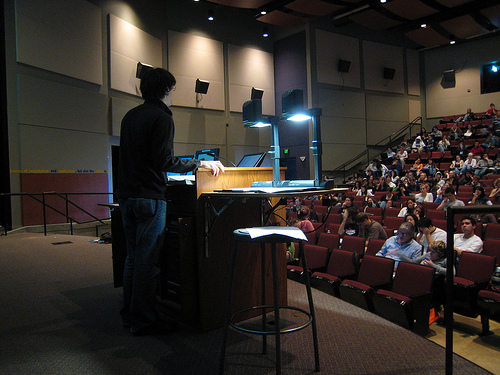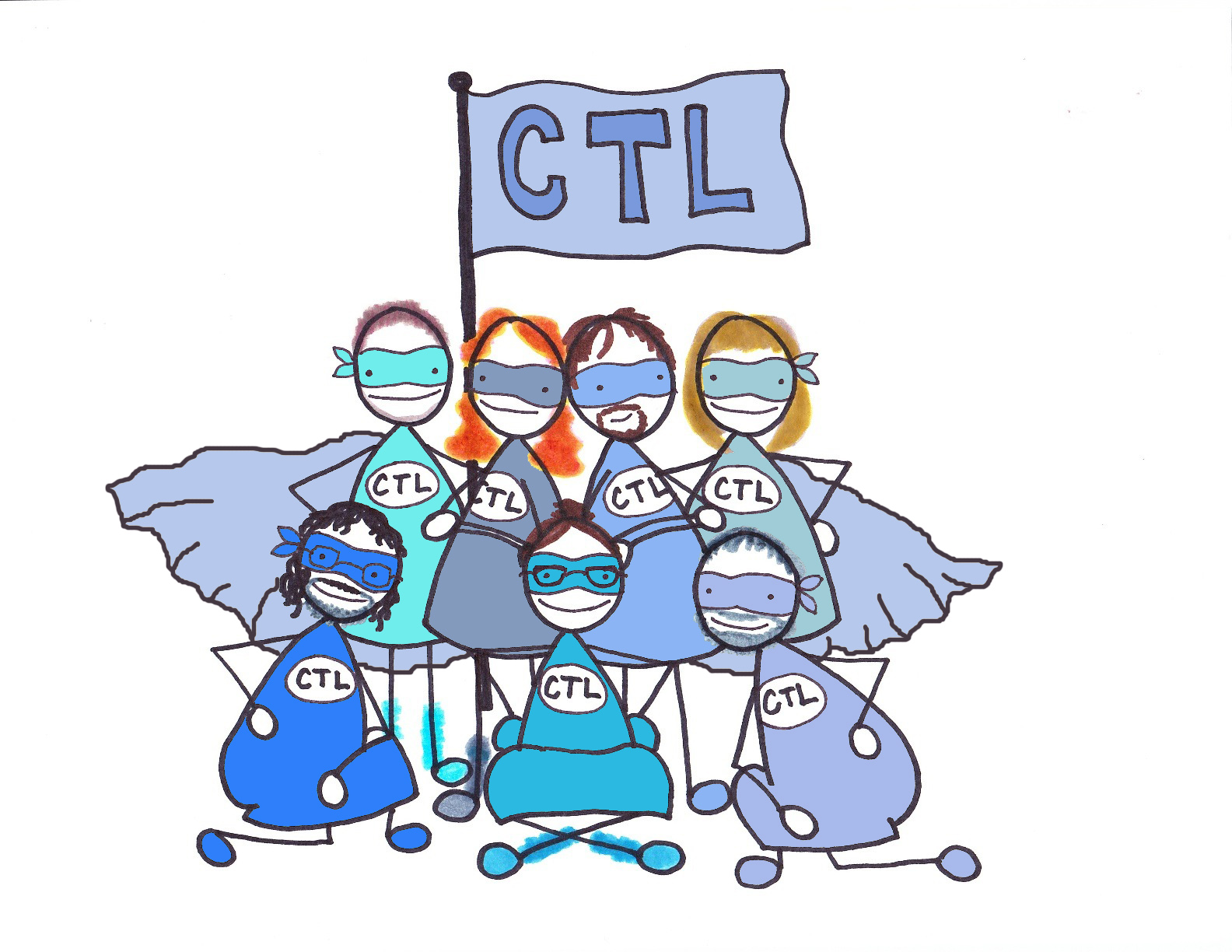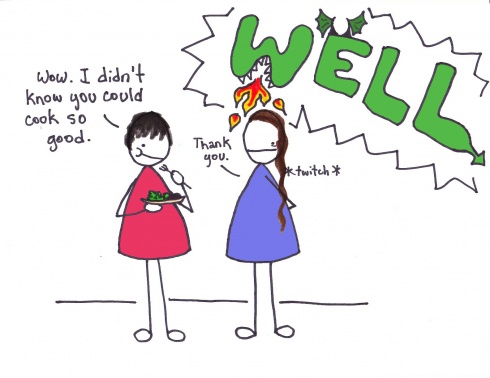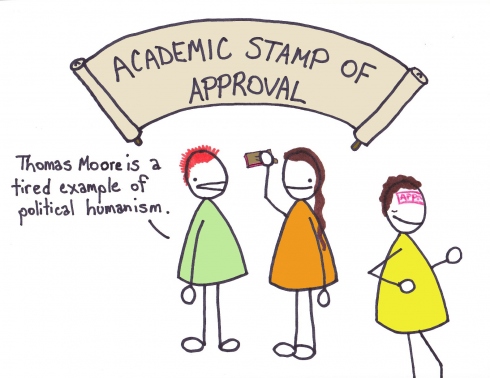Are you good at what you do? If so, the UWindsor Centre for Teaching and Learning wants to know about it.
 Nominations are currently being invited for awards recognizing graduate student contributions to teaching.
Nominations are currently being invited for awards recognizing graduate student contributions to teaching.
The Centre for Teaching and Learning is calling for nominations for two awards recognizing contributions by graduate and teaching assistants to the University’s learning environment.
Nominations for the GA/TA Award for Educational Practice and the GA/TA Award for Educational Leadership must be submitted no later than March 7.
Details—including criteria, eligibility, and nominations forms—are available on the centre’s Web site. Questions and comments may be directed to Michael Potter at pottermk@uwindsor.ca or 519-253-3000, ext. 4831.
Did you know that eight out of five dentists say that studying in the library is six bajillion times more effective than studying in your shower? The Harold B. Lee Library Multimedia Crew (two staff and ten students) put together this video: New Spice | Study Like a Scholar based on the new Old Spice viral video senstations which feature Isaiah Mustafa. Anything is possible when you’re in a library!
Enjoy and Happy weekend!

(This is also meant to serve as a reminder to all the folks who said they would send in their links! Let’s have ’em!)
This blog has a small blogroll collection started in the sidebar down and over on the right, but we’d love to grow that list longer.
One word of warning: comments will only accept one link per. More than that will trigger our spam crushers.
Link quest….begun!
Do you struggle with giving feedback to your students? This short tongue-in-cheek video is based on Sergio J. Piccinin’s 2003 STLHE Green Guide, Feedback: Key to Learning. How could you adapt the suggestions for your own discipline?
Guest post by Glenn Rideout PhD and graduate teaching assistant Holly Renaud
This short chapter addresses the work of GAs and TAs from the perspective of both the professor and the student. Part 1 focuses primarily on the expectations of the professor, and Part 2 focuses primarily on the experiences of the student. These sections have been written by Professor Glenn Rideout, PhD and his Graduate Assistant Holly Renaud. The reader may note some overlap and identify some differences in the two interpretations of the role of GA. Since such potential differences may be the turning point on which the success or failure of GA-professor professional relationships hinge, open communication is important. It is strongly recommended that through such communication, expectations and responsibilities in both directions are clearly understood.
The Professor’s Expectation
I have employed graduate assistants for several years. I assign these students a variety of tasks associated with tracking student performance and maintaining records. I have a high expectation that GAs will take full responsibility for fulfilling the terms of their contract, as identified initially in the paperwork that is completed at the beginning of the employment period. This usually identifies the rate of pay, the number of hours and the tasks to be performed. This latter item is usually quite general and allows a fair amount of flexibility regarding the assignment of tasks associated with the professor’s particular needs.
 Beyond this general statement of responsibilities, during my first or second meeting with the GA, I usually initiate a frank discussion in which I am interested in hearing what the GA’s strengths are, and well as identifying particular points that are very important to me. High on this list is promptness. I have learned from experience that it is important to make it clear that I expect a 10 AM meeting to be at 10 AM. Also related to time, and having learned from experience, I expect the GA to keep a record of hours worked – it is the GA’s responsibility to tell me if I am in danger of exceeding the allotted time per week (usually 10 hours) or per semester if the work schedule is light in some weeks and heavier in others. I expect that the GA will accomplish the task within the time frame identified, and that if a problem arises that might prevent this, that I will know about this ahead of time. I expect that the GA will develop early on an understanding of how my courses work, how their work fits into the master plan of successful course delivery, and how their skills can best facilitate this.
Beyond this general statement of responsibilities, during my first or second meeting with the GA, I usually initiate a frank discussion in which I am interested in hearing what the GA’s strengths are, and well as identifying particular points that are very important to me. High on this list is promptness. I have learned from experience that it is important to make it clear that I expect a 10 AM meeting to be at 10 AM. Also related to time, and having learned from experience, I expect the GA to keep a record of hours worked – it is the GA’s responsibility to tell me if I am in danger of exceeding the allotted time per week (usually 10 hours) or per semester if the work schedule is light in some weeks and heavier in others. I expect that the GA will accomplish the task within the time frame identified, and that if a problem arises that might prevent this, that I will know about this ahead of time. I expect that the GA will develop early on an understanding of how my courses work, how their work fits into the master plan of successful course delivery, and how their skills can best facilitate this.
I use regular ‘check-ins’ with my GA, to ensure that we are on track regarding hours used, that semester long tasks that I only see the results of at the end of a semester are on track, and that there are no ‘issues’ simmering just under the surface. I often ask: “So…how are we doing?” I expect and have received honest feedback in this regard. The intent is to provide the most positive work experience possible for the GA and to accomplish important tasks related to my own work load.
There are a number of ‘side’ benefits that a GA can reap from such employment. These are not always realized by the GA, since it is only when a professor senses an interest in and a commitment to the work at hand on the part of the GA that these things might materialize. For example, most professors are involved in research projects that may require assistance beyond the scope of the GAship. Often such research initiatives are funded, so professors can pay for additional work in areas not necessarily related to the GA responsibilities. GAs who avail of such opportunities often gain invaluable experience and grow in scholarship (and items for their CV) as a result of such unanticipated opportunities. Of course, professors are under no expectation or obligation to hire GAs as their Research Assistants (RA) but GAs can position themselves favourably by fulfilling their roles with excellence.
The Graduate Assistant’s Experience
Being a Graduate Assistant or Teaching Assistant can be an extremely rewarding experience. I never applied to be a Teaching Assistant during my undergraduate years and now that I am employed as a Graduate Assistant, I regret not doing this sooner. It has been a wonderful opportunity to network with other students and professors and to add some practical experience to a résumé.
During my short time in this role, I have learned quite a bit. My duties have ranged from collecting, interpreting, and assessing clicker data, to grading midterms and assignments, to creating a forum through CLEW for students to use to communicate with each other or to submit some of their assignments, to proctoring midterms, to answering students’ questions. And I have learned a lot through doing all of this, some with a fair amount of frustration as accompaniment but all with pleasure and a feeling of accomplishment.
Everyone’s experiences as a Graduate or Teaching Assistant will be different, depending on what your professor asks of you, the department in which you work, your previous experiences, and other variables. But I would like to take this opportunity to offer some general advice to anyone new to this role.
First, know your subject area. If your experiences have only been as a student, you will soon come to realize there is a vast difference between sitting at a desk taking notes and either standing at the front of the room to teach a class or preparing material behind the scenes. You do not need to be an expert in the subject, but you should know enough that you feel comfortable. If you’re running a lab session, familiarize yourself with the lab setting, the materials you will be using, and the rules or safety precautions of that area.
Expect to be challenged. Students may ask you questions and you may not have the answer. Your professor may ask you to perform a certain duty that you’ve never attempted. Don’t make up an answer on the spot or lie and pretend you’re an expert. There’s no shame in admitting you don’t have all the answers. Try responses like, “That’s a good question. I’m not sure of the answer but I will try to find out for you,” or “I don’t know the answer. Maybe you could find it and report back to us,” or “I’m sorry, but I’ve never used this program before. Could you please explain it to me?” Don’t be afraid to ask clarifying questions along the way.
Always make time for yourself. If you’re a contact person for the students, make sure you set office hours. Try not to check your email too obsessively. You’ll drive yourself crazy if you immerse yourself too fully in work. Try to remind yourself that you are only allowed to work so many hours each week. It’s also key to remember that your school work comes before your Graduate or Teaching Assistant duties. Your grades and your sanity matter and your regular coursework will keep you busy enough.
Improve your organizational skills. You’ll most likely, if you’re anything like me, need to work on your organization skills. You will probably need to arrange some sort of a schedule to know when your projects, assignments, papers, and exams are due as well as when your Graduate or Teaching Assistant duties must be completed.
Upgrade your job-related skills. The university provides seminars, lectures, and training opportunities in various software programs. I strongly recommend attending them when your schedule allows it. But if you cannot make it for whatever reason, look at the different organizations on campus that can help you, such as the Centre for Teaching and Learning.
It is vital that you be professional, consistent, and genuine. You carry a great responsibility to help provide your students the best education you can offer. Maintain confidentiality at all times. Be a role model for your students. Be friendly, but maintain a professional distance. Wait until the course in which you are assisting is completed before you go out for that coffee date with a student. Be fair with all students. If they happen to rub you the wrong way on a personal level, ignore it and push down those feelings. You are there in a professional capacity and need to behave as such. Becoming close friends or enemies with any students will lead to awkward situations and inconsistent treatment and grading. I also recommend doing as much “blind” grading as you can so that you don’t begin to label your students as “A” or “C+” any time you see their name on a piece of paper. This doesn’t mean you have to be rude or distant with your students. If they need help then you should be there to help them. If you genuinely want your students to learn and succeed, they will pick up on that enthusiasm. The opposite is also true.
You need to realize early on that you will make mistakes. No one is perfect. Accept these mistakes, learn from them, and move on. Feel free to laugh at yourself. Accept that the first time you teach a topic or use a new computer program, it might not go well at all. Ask your professor for help, apologize to the students if you confuse them and try again, and always remember there is a support system for you. Most importantly, have fun with it. You probably won’t like every single aspect or every single duty, but you have to do what you love and love what you’re doing.
Good luck!
Flickr image by redteam. Licensed under Creative Commons.
In any new situation, there are bound to be questions:
 How do I … ?
How do I … ?
When should I … ?
What do I do if … ?
What’s the best way to … ?
Who is in charge of … ?
Where can I … ?
Sometimes those who’ve come before pass on their tips and sometimes you find answers through trial and error. Sometimes you muddle through, doing the best you can, and sometimes you just know there’s got to be a better way. What to do when this happens?
There are a number of places to go and maybe you’ve found more. Add those in the comments. For now, try these:
Ask your supervisor. Part of being a teacher is training the next generation.
Ask your fellow teaching assistants. There’s a wealth of experience around you. Maybe there’s someone who’s been a TA in the course you’re in now, or maybe someone in your department, but helping in another course, has been where you are now. It’s only a matter of asking.
Ask teaching assistants in other departments. Some things that assistants do are discipline specific; physics labs are different from language labs, I get that. However, some things cross boundaries. Begging, borrowing, and building on the work of others is part of the process.
Head to the Centre for Teaching and Learning. The workshops, classes, and consultations are for you. Think of our CTL team like your own squad of teaching and learning superheroes. These individuals want to talk about making teaching and learning more effective across campus and their experience spans disciplines, styles, strengths, and interests.
Teaching assistants are an important part of the university’s teaching and learning team. Take advantage of the superhero expertise and work toward becoming a teaching and learning superhero yourself!
Image by Sharpie Sandbox, used with permission.
Guest post by Danielle Bechard and Rod Turton
In order to become a Graduate or Teaching Assistant (GA/TA), one must demonstrate an exceptional level of academic accomplishment. Yet, to go beyond the traditional role of GA/TA and develop a community takes much more. The path towards becoming more than ‘just’ a GA/TA is one that requires persistence, determination, focus, and passion. The following article highlights the experiences of undergraduate students from the Mentorship and Learning Program in Faculty of Arts and Social (FASS) at the University of Windsor, and the steps they took to transcend their role of teaching assistants to become community-building peer mentors.
Background

The Mentorship and Learning program is a 400-level interdisciplinary course in FASS. The goal of the innovative program is to pair first year FASS students with upper-year students to establish a mentee-mentor dynamic. The first semester of Mentorship is devoted towards research and elementary training in such areas as feedback, inclusive teaching, and cultural diversity. The following semester is geared toward practical learning, as the students are placed in first year classrooms across FASS. To date, student mentors have been placed in first year History, Drama, Political Science, and General Arts courses. Students continue to develop their skills as they ‘mentor’ a small group of first year students under the supervision of their designated professor. Though the majority of students in Mentorship and Learning come from different disciplines, the goal of the program is universal: to develop a sense of community between mentor and mentees, resulting in a memorable and successful learning experience for both parties. Following personal and professional success in the two-semester course, a few students are invited by course instructors to assist with the new mentors the following year as Teaching Assistants, or in Mentorship terms, ‘Senior Mentors.’
What’s in a Name?
The first day of your GA/TA position may be an overwhelming experience. To make sense of the chaos, it is imperative to learn the names of your students. This can be a challenging venture, but it is crucial to foster a relationship between yourself and the student. In lab settings, when possible, it is also advantageous to encourage students to learn each others’ names. This helps to abolish the stigma of being ‘just a number’ as a university student, and promotes the idea of student-centric teaching and learning. Suddenly, the students’ feeling of anonymity is replaced with a sense of personal connection to the GA/TA and other students, thus providing students with encouragement to attend class.
To accomplish this goal, be creative! If you are afforded tutorial sessions with the students, devote time throughout your first few sessions for student introductions and name-learning exercises. If you do not have the opportunity to facilitate a lab, e-mail is an excellent way to initiate a relationship with each student, from which you can begin to establish a sense of openness and community. In short, be accessible.
Help! I Need Somebody
Accessibility is an essential quality of an effective GA/TA. Office hours are not enough. Accessibility means being available to every student, even outside of the classroom. A GA/TA should regularly email students with reminders, suggestions, and encouragement. Take the time to meet with students to give them feedback and ideas, and give them opportunities to discuss personal and academic obstacles with you. It is up to the GA/TA to create a comfortable, approachable environment. This reciprocity allows the students to learn from you in a casual way and also allows you to learn frm your students. Remember: you are their peer, and they should not be afraid to approach you with difficulties or inquiries. Going the extra mile will contribute to the success of your students; your ultimate goal.
Take a Boring Lesson and Make it Better
After you’ve established a bond with your students, you can expect them to approach you with questions about the course material. So, know your stuff! Once you have a firm and complete understanding of the readings, assignments, and course outcomes, you can continue to go the extra mile by bringing innovative strategies into your facilitation. Keep in mind that you are not the professor; instead, you are there to shed light where the professor cannot. Develop your own facilitation style so that you are confident in your role in the classroom, whatever that role may be. If you are allotted lab time with the students, think of ways that you can engage them whilst delivering course content. Get them on their feet, ignite a discussion, use visuals – find some way to put the ‘fun’ back into fundamental learning, and give the students a unique and exciting classroom experience. Cater to your community by recognizing the differentiated learning styles that exist within your group of students, and make use of different tactics which could appeal to a wide variety of learners.
We’re All in This Together
The goal of becoming more than ‘just’ a GA/TA is to create an interpersonal community to enhance the success of the students and GA/TAs alike. It is important to note that learning communities come in all shapes and sizes, each unique with specific goals and aspirations. The practices mentioned here have proven invaluable for both parties, and by creating a community in this way, you can be confident that students will begin to feel a kinship amongst each other and with you, the GA/TA. The atmosphere of the classroom becomes one of comfort, and within it even the most timid of students can find the courage to contribute to discussions or engage in activities. If your community is successful, its influence will carry beyond the final exam.
Now What?
These strategies should help you on your path to becoming an excellent GA/TA. This road is not without obstacle, but with the proper community-building strategies and determination you shall undoubtedly meet great success. Luckily, you are not on this road alone. Find past and current GA/TAs to share your successes and struggles with. They are all members of your community.
Let’s review:
- Learn students’ names.
- Make yourself accessible.
- Use creative techniques to engage.
- Be mindful of varying learning styles.
- Make community your goal.
- Find other GA/TAs for support.
- Have fun!
Helpful Resources
Cameron, B. Active Learning. London, ON: Society for Teaching and Learning in Higher Education.
Guo, S., Jamal, Z. Cultural Diversity and Inclusive Teaching. London, ON: Society for Teaching and Learning in Higher Education.
Kustra, E., Potter, M. (2007). Leading Effective Discussions. London, ON: Society for Teaching and Learning in Higher Education.
Piccinin, S. (2003). Feedback: Key to Learning. London, ON: Society for Teaching and Learning in Higher Education.
Life happens.

For most of us, school is one piece of a complex life that includes any mix of family, friends, other jobs, hobbies (as well as weather, cars, buses, neighbours, pets, printers, hard drives…you get the idea). Things sometimes do not go according to plans: cars get snowed in, printers run out of ink, people get sick. Students are, after all, people too.
Do you (or does your supervisor) have a policy for granting extensions or makeup tests? Is it part of the classroom contract you set out at the beginning of the semester or do you take each case individually? Do you think it matters what type of class or work has been missed: labs vs. essays vs. midterms?





Recent Comments